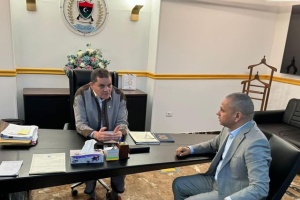By Omar Khattaly, former Head of Real Estate Fund, Libyan Investment Authority
Libyan Investment Authority; Future Investments or Benefit to the Elite

On Sunday, February 12, 2017, the Libyan Investment Authority (LIA) staff at Tripoli Tower was surprised when previous Chairperson of the Authority, Mr. Abdel Majid Breish, and a local Al Nawasi militia forced their way into Briesh’s former offices and secured the building. Despite being appointed by the Government of National Accord and its head Mr. Fayez Al Seraj, current Chairperson Mr. Ali Mahmud was asked by the militia to vacate his office immediately.
In this hostile takeover Breish was accompanied by his old staff: Abdel Rahman Ayad, former Head of Finance; Mostafa Ismail, former Head of the Legal Department; and the ever loyal former Head of HR, Akram Abushkewat. The entire current staff, including the heads of Legal, Finance, IT, and Investments departments, have walked out of their offices in protest and have since issued a statement announcing their rejection of such a violent and chaotic move by the former Chairperson. This move has once again put LIA and its investments in harm’s way and has further shaken the organization’s credibility in the finance and investment world.
Since Libya’s revolution in 2011, the fund, its $67 billion dollar investments and its positional power have been the center of political maneuvering and control struggles. Although the UN and the EU froze most of the fund’s assets in 2012, many political groups are in a marathon for what the fund can provide in terms of expensive board membership appointments, executive positions and access to a very lucrative, and rare in Libya, lifestyle backed by euros and dollars.
In the past 5 years, six chairperson and CEO’s have led the fund, which is unprecedented and unheard of in the world of investments. During my research, there has never been an investment fund or a company that has seen such a volatile change in its executive leadership. This atmosphere has adversely affected the fund’s performance and functionality.
Currently it remains unclear why Mr. Breish, a UK educated citizen past the Libyan legal age of retirement, whose contract with LIA expired in 2016, continues to engage in this degree of chaos to control LIA. Previously, I have written and warned on the danger of leaving this international fund in Libya where no functional government or control mechanisms are in place. At this point, my biggest fear is that substantial funds held by the LIA may fall into the wrong hands.
Disclaimer: The views and opinions expressed in this article are those of the writer, and do not necessarily reflect those of the Libya Observer





